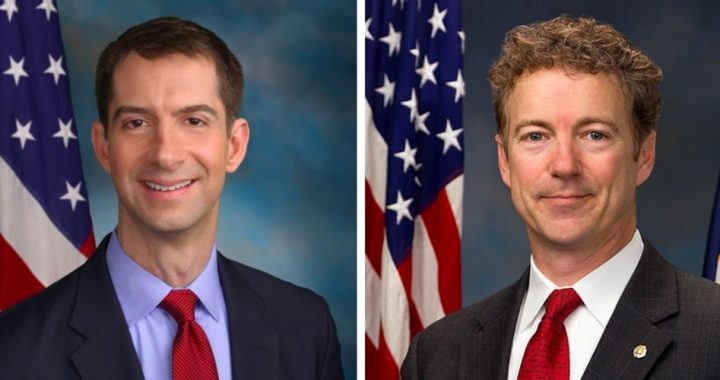
Senator Tom Cotton (R-Ark.; photo on left) is a Senate neophyte and the fresh new face of the neoconservative wing of the Republican Party. He’s set to earn his bones with his hawk elders by taking down Senator Rand Paul (R-Ky.; photo on right) and the libertarian bloc in the forthcoming fight over renewal of key Patriot Act provisions.
Politico puts it this way: “The 37-year-old Iraq and Afghanistan veteran, who vaulted to the Senate this year after a single term in the House, is maneuvering to build support for extending existing surveillance authority for the U.S. government — without the additional safeguards civil libertarians want.”
Despite being a newcomer to the senate, Cotton has already attracted more than his share of controversy, all of which have bolstered his neocon bona fides.
Earlier this month, for example, Cotton urged President Obama to bomb Iran.
“For interfering with weapons inspectors and for disobeying Security Council resolutions, all we’re asking is that the president simply be as tough in the protection of America’s national security interests as Bill Clinton was.”
Cotton’s Clinton compliment refers to the latter’s December 1998 bombing of Iraq.
Most infamously, perhaps, is Cotton’s signature (along with 46 other GOP senators) on a letter sent in March to the “Leaders of the Islamic Republic of Iran.” The letter was ostensibly intended to explain the U.S. constitutional system to the Iranian government, particularly as it pertains to negotiating and ratifying international agreements.
Among the other names attached to that missive was that of Cotton’s now nemesis, Rand Paul. In an article analyzing the issue published in The New American, Warren Mass pointed to the potential problems his participation in the communique might cause Paul, now an official candidate for president:
Paul’s signature on the letter might create wonderment among many of his supporters, many of whom expect him to advocate the noninterventionist, conciliatory foreign policy often voiced by his father, former Representative Ron Paul. The elder Paul expressed support for conducting negotiations with Iran many times, including in a Texas Straight Talk column on October 7, 2013.
In that column, the former representative and presidential candidate called attention to a then-recent telephone conversation between President Obama and the leader of Iran and noted that he had been “saying for years that we should just talk to the Iranians.” Paul went on to say:
It is also probably a good sign that this phone call has infuriated the neoconservatives at home, the pro-war faction in Israel, and the hard-liners in Iran. Now that a process of negotiation has begun, the chance of war has been significantly reduced. The U.S. is very unlikely to bomb Iran while it is talking with them, and Israel is also unlikely to start a war while the U.S. is at the negotiating table with the Iranian leadership.
Regardless of how the two lawmakers managed to find common ground long enough to reach out to Iran’s government, they have each returned to their own turf in preparation for the rumble over the Patriot Act.
In a statement quoted in the Politico article, Cotton affirmed his America-as-the-World’s-Police-Force attitude.
“Almost every Republican elected last year believes that America is strong and safe when America is leading the world,” Cotton said in an interview in his Senate office. “And I don’t think many Republicans will want to see critical programs expire that will reopen intelligence gaps from the 1990s.”
To Cotton’s credit, he’s very good at gilding the lily. In this case, the gild is an alloy of internationalism and Big Brother-worthy surveillance and the lily is the Constitution of the United States and the civil liberties it protects.
Cotton and the rest of the neocons and their fellow travelers are set to openly and notoriously violate their oaths of office by voting for a bill co-sponsored by Senator Majority Leader Mitch McConnell (R-Ky.) and Senator Richard Burr (R-NC). The measure would give another five-and-a-half years of life to the three Patriot Act provisions that would otherwise expire.
The most egregious extension would be that granted to Section 215, the Patriot Act provision that “authorizes” the bulk collection of phone records by the National Security Agency (NSA).
As for the rest of the constitutional destruction wrought by the bill, Politico reports:
“The bill also would prolong two other measures : A so-called “lone wolf” provision that allows the government to surveil potential terrorists who aren’t directly connected to terrorist cells; and a section that allows the feds to use roving wiretaps to monitor suspects who rapidly change location or communication device.”
“Potential terrorists not directly connected to terrorist cells.” In other words, a person whose effects and papers were meant to be protected from unwarranted government search and seizure.
Lest anyone be worried that Rand Paul might weaken his resistance to the Patriot Act renewal in an effort to appeal to more mainstream Republicans, the candidate made his position crystal clear at a recent event.
During remarks he made after receiving an award from the Constitution Project, Paul said, referring to the NSA’s unconstitutional collection of phone data, “Our Founding Fathers would be mortified.”
“Millions of people’s phone records are being collected,” he added.
“To my mind, the Fourth Amendment says you need to name an individual. I don’t know anybody named Mr. Verizon.”
Paul’s rebellion against the surveillance state is not new.
In February 2014, Paul filed a class-action lawsuit against the Obama administration, challenging the constitutionality of the National Security Agency’s dragnet collection of metadata.
“There’s a huge and growing swell of protest in this country of people who are outraged that their records are being taken without suspicion, without a judge’s warrant and without individualization,” Paul said, standing outside the U.S. District Court for the District of Columbia where the suit was filed.
In a statement made in a video defending the Fourth Amendment, Paul declares, “Our Founders never intended for Americans to trust their government.”
And that, it seems, is the essence of the very distinct approaches to liberty taken by Senator Cotton and his cohorts and Senator Paul and his.
Cotton and his sort believe that individual liberty and the constitutional provisions that were written to protect them from a government that the Founders believed would ever be grasping for more power should be sacrificed on the altar of safety.
Paul and the lawmakers committed to constitutionally guaranteed liberty believe that government is an evil that must be endured and that any act — every act — of the federal government must be authorized by the very Constitution that gave it life and that personal freedom is sacrosanct and must be protected from the government that was created to protect that freedom, not destroy it.
As Thomas Jefferson said, “In questions of power then, let no more be heard of confidence in man, but bind him down from mischief by the chains of the constitution.”
Cotton had something to say about binding, as well, but it doesn’t quite take the Jeffersonian tack.
Speaking of the claim that the bill to extend the Patriot Act provisions should include better safeguards for privacy, Cotton said, “That’s unneeded, and it also ties the hands of not only the commander-in-chief but also the intelligence professionals.”
Bottom line: Cotton wants to break the chains of the Constitution that keep our government under our control and Rand Paul wants to tighten them.
The battle over extending the life of the surveillance state will ramp up quickly as the relevant provisions are set to expire on May 31.



